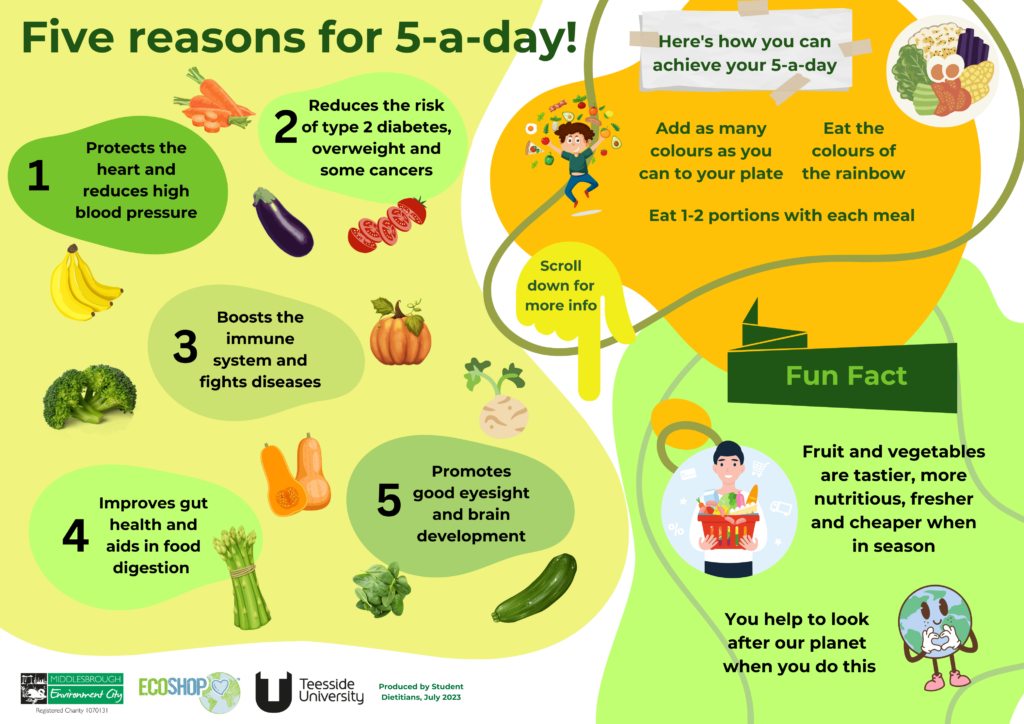
The health benefits of eating fruit and vegetables are numerous. They contribute to a healthy, balanced diet. Therefore consuming at least five portions of fruit and vegetables daily is recommended. Fruit and vegetables are a good source of vitamins and minerals which are required by the body to function properly. They’re an excellent source of dietary fibre, which can help to maintain a healthy gut and prevent constipation and other digestion problems. A diet high in fibre can also reduce your risk of bowel cancer. There is evidence to show that for every portion of fruit and vegetables eaten there is greater protection against heart disease and strokes (by up to 30 per cent), and some cancers (by up to 20 per cent).
Fresh fruit and vegetables are also usually low in fat and calories which help maintain a healthy weight and keep the heart healthy. They contain phytochemicals (naturally occurring plant substances) and powerful antioxidants, protecting the body from harmful free radicals that can cause disease. Other health benefits include a delay in the development of cataracts (cloudy lens of the eye) and age-related macular degeneration, reducing the symptoms of asthma, improving digestive health, better management of diabetes and the potential for improved bone health.
Some commonly found fresh produce in Eco shop and their health benefits.
Celeriac – Good source of fibre for the relief of constipation. It has low glycaemic index which is good for patients with diabetes. Vitamin C for a healthy immune system. Magnesium which supports low blood pressure and improves the work of the nervous system. Phosphorus which helps build strong bones and teeth. Potassium which maintains fluid level in the cell and supports heart muscles. Vitamin K which lowers risk of bone fractures and promotes wound healing.
Broccoli – Contains iron for good blood flow in the body. Good source of calcium for strong bones and teeth. Fibre for gut health and immunity. Folic acid for red blood cell formation. Magnesium which regulates blood glucose level and supports the body to make protein. Phosphorus which helps build strong bones and teeth.
Asparagus – Contains prebiotic for gut health. Rich in folate which helps the body to produce healthy red blood cells. Folate is also important for the development of baby’s brain pregnancy (power brain booster). Good source of potassium which may lower blood pressure. Amino acid supports excess fluid excretion (oedema). Antioxidants which reduce free radicals and slow down ageing.
Courgettes – High fibre and low-calorie count for weight loss. Antioxidants which reduce oxidative stress and likelihood of developing cancer. High source of vitamin B6 which regulates blood glucose. Contains vitamin A for healthy eyes. Also, potassium for heart health and folate for blood formation.
Aubergine – Fibre for digestion. Vitamin A and C– antioxidants which protect cells. Contains Potassium, Calcium, Vitamin k for bone health. Nasunin which helps to manage blood glucose levels. Bioflavonoids for reduction of blood pressure.
Butternut squash – High in vitamin A (beta-carotene and alpha-carotene), vitamin C, Magnesium, Potassium for lower blood pressure and Calcium for strong bones. Can keep one hydrated. Vitamin A is important for normal vision and the immune system. Good source of fibre for weight loss and reduction of risk of cancer. Fibre which helps to manage blood glucose levels by regulating the body’s use of sugar.
Pumpkins – Low calorie for weight loss and diabetes management. Packed with vitamin A protects the body from free radicals which could prevent cancer and other organ diseases. Vitamin A for eyesight, healthy skin, bones, lungs, and kidney. Healthy heart vitamins and minerals such as A, B1, B6, C, Fibre, Folate, Manganese, Calcium, Potassium, and Magnesium. Lowers blood pressure and cholesterol level. Others include E, B2, Iron, Copper.
Kale – Contains Vitamin A for eye, bone, and immunity. Vitamin C for strong immunity. Vitamin K for blood clotting. folate for brain development. More omega-3 than in fish for a healthy heart. Iron for blood formation and proper blood flow. Good source of calcium for strong bones and teeth. Folic acid for red blood cell formation. Lutein for prevention of eye cataracts and great cognition.
Spinach – Contains Iron for good blood flow in the body – healthy blood. Good source of Calcium for strong bone and teeth. Folic acid for red blood cell formation. Potassium for lower blood pressure. Lutein for prevention of eye cataracts and to aid cognition. Vitamin K for bone development. Vitamin A for eye and skin health.
What is a portion?
Both adults and children should eat at least 5 portions of fruits and vegetables every day. A child’s food needs depend on age, body size and levels of physical activity. An adult’s portion of fruit or vegetable is 80g and 30g for dried fruits. As a rough guide, a portion is the amount that can be fit into the palm of the hand, 2 or more fresh fruits, 1 medium fresh fruit, half large fresh fruit, 1 heaped tablespoon dried fruit, 3 tablespoons of vegetables. Tinned or frozen fruit should be the same quantity as the fresh fruits.
Some examples include 5cm cucumber, avocado (half big size and 1 medium size), 1 medium banana, 3 tablespoons diced celeriac, 2 spears 8 florets broccoli, 8 florets of cauliflower, 7 spears asparagus, half large courgette, one-third aubergine, 3 heaped tablespoons diced butternut squash, 3 heaped tablespoons diced pumpkins, 4 heaped tablespoons kale, 4 heaped tablespoons spinach, 1 medium stick or 3 heaped tablespoons diced carrots, 1 medium onion, 14 button or 3-4 heaped tablespoons mushrooms, 1 medium tomato, 7 cherry tomatoes, 1 heaped tomato puree concentrate, 2 whole plum tomatoes, 1 medium apple, 1 medium pears, 14 grapes, 7 strawberries, 2 handfuls (4 heaped tablespoon) blueberries, 1 stick celery.
3 heaped tablespoons of pulses e.g. peas, chickpeas, baked beans etc. one cereal bowl of salad.
For more sample portions, click here: https://www.nhs.uk/livewell/5aday/documents/downloads/5aday_portion_guide.pdf